Struggling with the dark cloud of depression is tough enough on its own, but when it comes hand in hand with overeating, it can feel like an endless cycle of despair. I am talking about depressed overeating.
We’ve all been there, finding solace in that extra slice of red velvet cake or the bottom of a bag of deep fried cheese balls, only to be left with a mix of guilt, shame and physical discomfort.
However, the good news is that there are certain things you can do to break free from the clutches of depressed overeating. There is light at the end of the tunnel, and all you have to do is have faith in yourself.
Before we delve into the strategies that can help you put a stop to depressed overeating, let’s find out the link between depression and overeating.
Related: 5 Effective Ways To Train Your Brain To STOP Overeating
What Is The Connection Between Depression And Overeating?
The link between depression and overeating can be quite complex. Depression can disrupt your appetite, leading you to overeat. Imbalances in neurotransmitters like serotonin can increase cravings for high-calorie foods. Depression can also disrupt your body’s circadian rhythm, causing irregular eating habits.
Moreover, people may turn to food as way of dealing with their emotional pain, however, this relief is short-lived, as this leads to more guilt, shame and regret.
When it comes to depressed overeating, you may have the urge to snack on high-calorie food, especially late at night. Late night binges can also throw off your body clock, disrupting your sleep in the process.
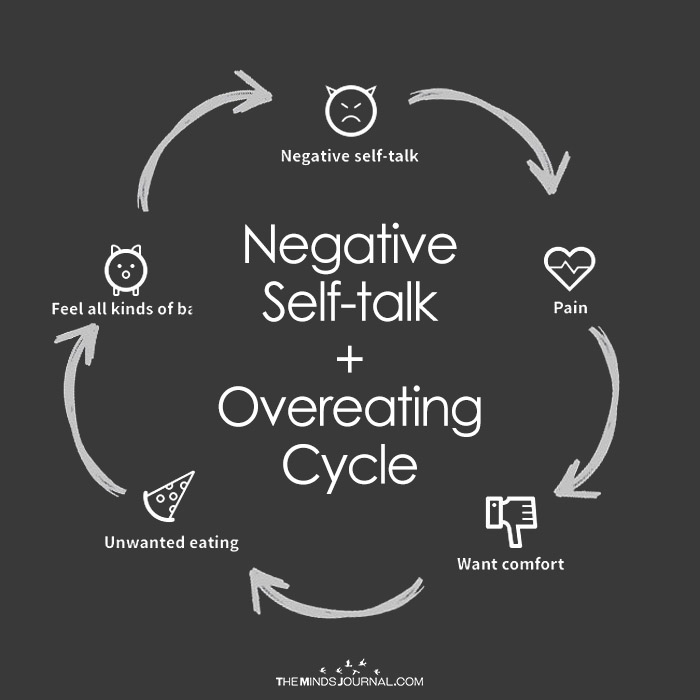
Okay, now that we have talked about the link between depression and overeating, let’s talk about how to stop overeating when depressed.
7 Ways You Can Stop Depressed Overeating
1. Practice mindful eating.
Mindful eating is one of the best things to do if you’re trying to stop depressed overeating. When you’re in that zone, chances are you finish a lot of food in a very short time, and you don’t even realize it, do you? Don’t worry, we’ve all been there.
The art of mindful eating can tremendously help you when it comes to this struggle. Instead of scarfing down your food on autopilot, take a breather. Slow it down, pay attention to the taste and texture, and actually enjoy each bite. It’s like giving your taste buds a VIP treatment.
Plus, tuning into your body’s signals helps you know when you’re truly hungry or full, which means no more unnecessary munching.
2. Create a well-structured meal plan.
Imagine having a meal plan that keeps you focused and far from the lure of unhealthy snacks. It’s centered on keeping you well-fed with healthy and delicious meals and timely nibbles throughout your day; there won’t be any cravings catching you off guard.
Set aside some time to map out your meals, jot down what you need to buy, and, if possible, get a head start by prepping ahead. And if this seems tricky, no worries!
Professional nutritionists are available for advice. They can tailor a feeding regimen that caters to both your physical needs and mental wellbeing.
3. Look into healthy emotional coping strategies.
One of the crucial strategies for preventing depressed overeating is this.
When things feel tough and overwhelming, you might want to drown your sorrows in a huge pint of ice-cream. But there are much better ways to handle those overwhelming emotions.
Consider activities that make you feel good, such as journaling, practicing mindfulness or meditation, walking outside and enjoying nature, or keeping yourself busy with your hobbies.
These aren’t just ways to take your mind off problems, they can actually improve your mood and help you cope with difficult feelings without binging on snacks.
Related: How To Stop Compulsive Overeating: 8 Practical Ways
4. Find healthier alternatives.
We all know those unmanageable cravings caused by depressed overeating, don’t we? However, even though it might feel very challenging, instead of falling back on the same old pattern, try to make some better choices.
Ditch the oily crisps and grab some air popped popcorn and add your own twist with herbs and spices. Or trade that slice of chocolate cake for some sweet fruits and a scoop of rich Greek yogurt.
Trust me, these tasty alternatives not only satisfy your cravings but also give your body the good stuff it craves. It’s like a win-win for your taste buds and your health.
5. Make it a point to exercise everyday.
How to stop overeating when depressed? Move your body!
Exercising and being physically active can do wonders for your physical and mental well-being. Working out makes your brain release endorphins, which naturally make you feel good.
And guess what? You don’t have to force yourself to run on a treadmill if you hate it. Dance to the music you love, go for a hike, or relax with yoga – choose an activity that brings you joy.
This not only fights off sadness but also helps you handle your emotions better and reduces the urge to indulge in overeating.
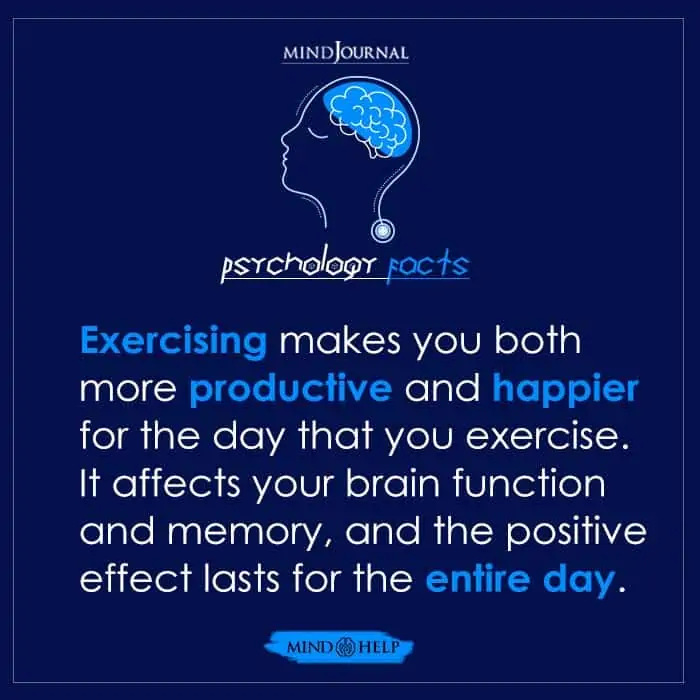
6. Practice stress-management techniques.
Stress can often trigger overeating episodes. However, there are some amazing methods to keep those feelings in check. Deep breathing is one of them. Think of it as a quick getaway for your thoughts.
Or you can also try progressive muscle relaxation, where you tense and release different muscle groups, and it’s surprisingly soothing. Activities like Tai Chi and Yoga can also do wonders when it comes to dealing with depressed overeating.
These are all healthier ways to deal with those overwhelming emotions, without reaching for the cookie jar.
7. Rely on your close ones for support.
When life hits you with those difficult situations and emotions, it’s good to have your squad on standby. Whether it’s your best friend, a family member, or even a work colleague you vibe with, reaching out for support can be a game-changer.
Opening about your feelings, venting your frustrations, or simply sharing a laugh with them can make you feel lighter and happier, and also prevent you from finding solace in food.
When you’ve got loving and supportive people beside you, they’ll provide all the advice, empathy, and encouragement necessary to stick to better eating habits.
Related: The 3 Main Causes Of Binge Eating and How You Can Stop
Bottomline
In the battle against depressed overeating, remember that progress is possible. By incorporating these strategies, you can reclaim control over your eating habits and find healthier ways to cope with depression. With time, perseverance, and a little kindness towards yourself, a brighter, balanced future awaits.
Do you struggle with depressed overeating? Do you have any more suggestions for how to stop overeating when depressed? Let us know in the comments down below!
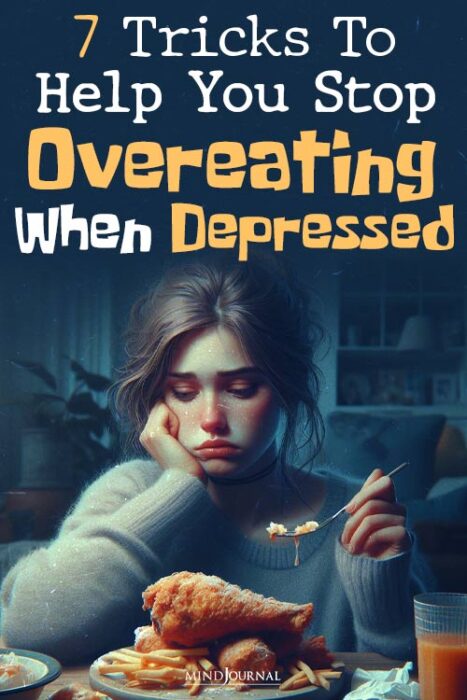
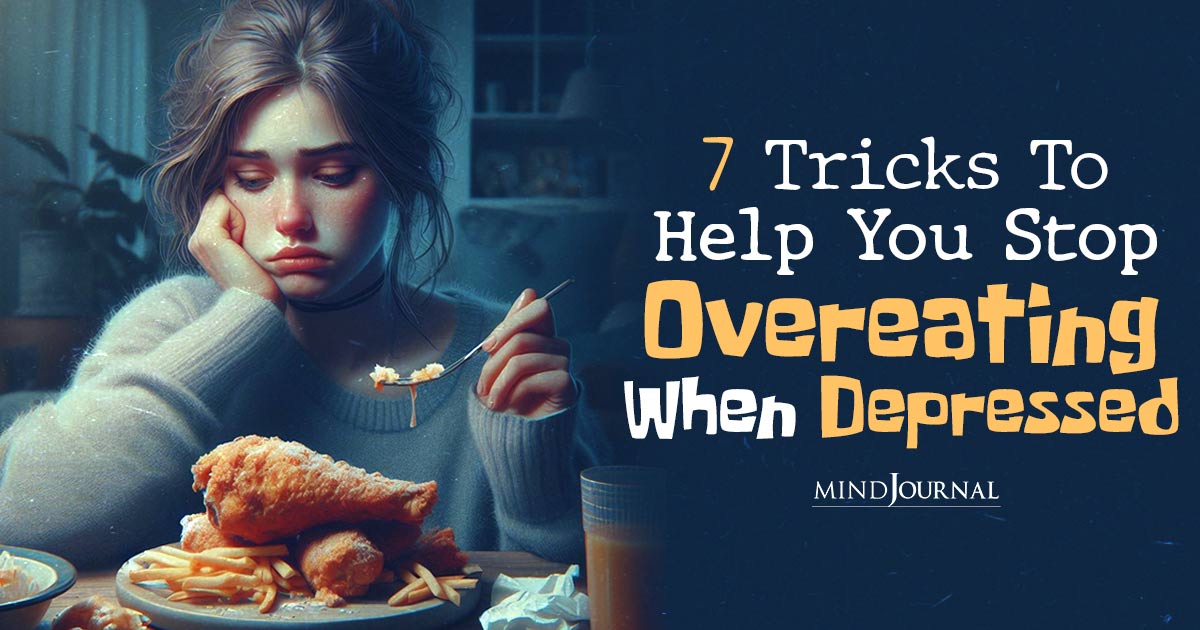





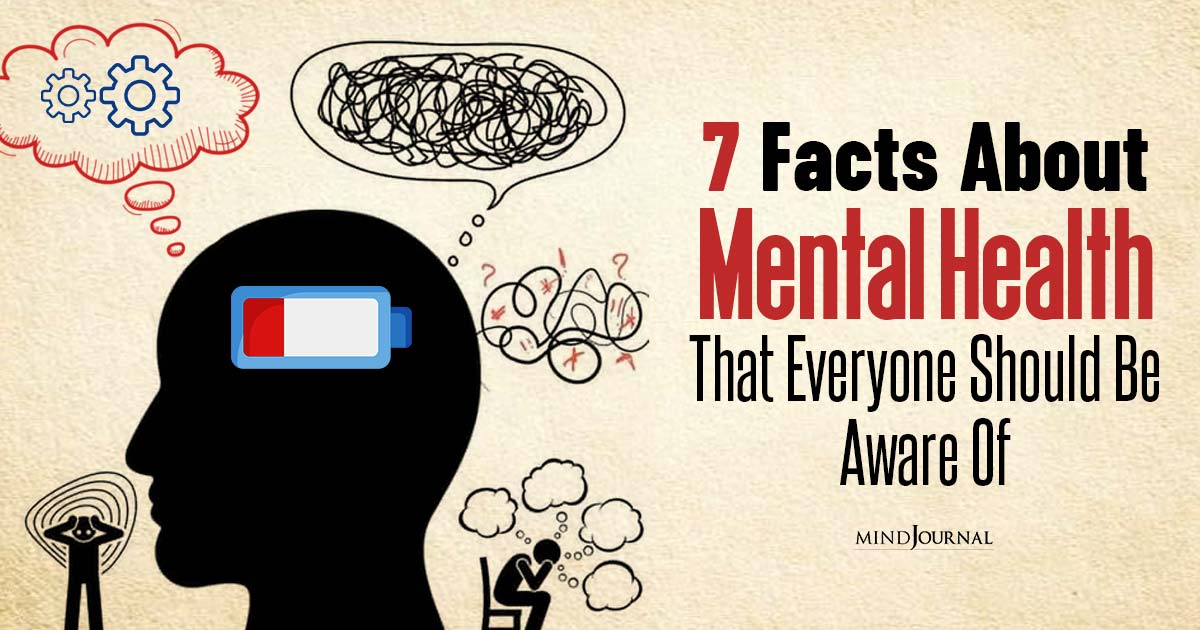

Leave a Reply
You must be logged in to post a comment.